Dietary Crocin Inhibits Colitis and Colitis-Associated Colorectal Carcinogenesis in Male ICR Mice
- PMID: 23326291
- PMCID: PMC3543809
- DOI: 10.1155/2012/820415
Dietary Crocin Inhibits Colitis and Colitis-Associated Colorectal Carcinogenesis in Male ICR Mice
Abstract
A natural carotenoid crocin is contained in saffron and gardenia flowers (crocuses and gardenias) and is used as a food colorant. This study reports the potential inhibitory effects of crocin against inflammation-associated mouse colon carcinogenesis and chemically induced colitis in male ICR mice. In the first experiment, dietary crocin significantly inhibited the development of colonic adenocarcinomas induced by azoxymethane (AOM) and dextran sodium sulfate (DSS) in mice by week 18. Crocin feeding also suppressed the proliferation and immunohistochemical expression of nuclear factor- (NF-) κB but increased the NF-E2-related factor 2 (Nrf2) expression, in adenocarcinoma cells. In the second experiment, dietary feeding with crocin for 4 weeks was able to inhibit DSS-induced colitis and decrease the mRNA expression of tumor necrosis factor α, interleukin- (IL-) 1β, IL-6, interferon γ, NF-κB, cyclooxygenase-2, and inducible nitric oxide synthase in the colorectal mucosa and increased the Nrf2 mRNA expression. Our results suggest that dietary crocin suppresses chemically induced colitis and colitis-related colon carcinogenesis in mice, at least partly by inhibiting inflammation and the mRNA expression of certain proinflammatory cytokines and inducible inflammatory enzymes. Therefore, crocin is a candidate for the prevention of colitis and inflammation-associated colon carcinogenesis.
Figures

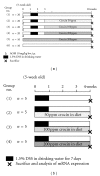
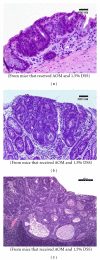
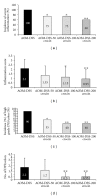
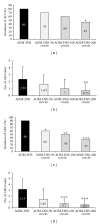




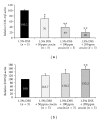

Similar articles
-
Dietary astaxanthin inhibits colitis and colitis-associated colon carcinogenesis in mice via modulation of the inflammatory cytokines.Chem Biol Interact. 2011 Aug 15;193(1):79-87. doi: 10.1016/j.cbi.2011.05.006. Epub 2011 May 20. Chem Biol Interact. 2011. PMID: 21621527
-
A newly synthesized compound, 4'-geranyloxyferulic acid-N(omega)-nitro-L-arginine methyl ester suppresses inflammation-associated colorectal carcinogenesis in male mice.Int J Cancer. 2014 Aug 15;135(4):774-84. doi: 10.1002/ijc.28718. Epub 2014 Jan 28. Int J Cancer. 2014. PMID: 24474144
-
Chemopreventive Effect of Aster glehni on Inflammation-Induced Colorectal Carcinogenesis in Mice.Nutrients. 2018 Feb 12;10(2):202. doi: 10.3390/nu10020202. Nutrients. 2018. PMID: 29439531 Free PMC article.
-
Effects of 17β-estradiol on colorectal cancer development after azoxymethane/dextran sulfate sodium treatment of ovariectomized mice.Biochem Pharmacol. 2019 Jun;164:139-151. doi: 10.1016/j.bcp.2019.04.011. Epub 2019 Apr 11. Biochem Pharmacol. 2019. PMID: 30981879
-
Crocin: Functional characteristics, extraction, food applications and efficacy against brain related disorders.Front Nutr. 2022 Dec 13;9:1009807. doi: 10.3389/fnut.2022.1009807. eCollection 2022. Front Nutr. 2022. PMID: 36583211 Free PMC article. Review.
Cited by
-
Apoptosis Exerts a Vital Role in the Treatment of Colitis-Associated Cancer by Herbal Medicine.Front Pharmacol. 2020 Apr 28;11:438. doi: 10.3389/fphar.2020.00438. eCollection 2020. Front Pharmacol. 2020. PMID: 32410986 Free PMC article. Review.
-
Saffron: The Golden Spice with Therapeutic Properties on Digestive Diseases.Nutrients. 2019 Apr 26;11(5):943. doi: 10.3390/nu11050943. Nutrients. 2019. PMID: 31027364 Free PMC article.
-
Reduced Production of Pro-Inflammatory and Pro-Catabolic Factors by Human Serum Metabolites Derived from a Patented Saffron Extract Intake.Pharmaceutics. 2024 Feb 28;16(3):336. doi: 10.3390/pharmaceutics16030336. Pharmaceutics. 2024. PMID: 38543230 Free PMC article.
-
Interaction of saffron and its constituents with Nrf2 signaling pathway: A review.Iran J Basic Med Sci. 2022 Jul;25(7):789-798. doi: 10.22038/IJBMS.2022.61986.13719. Iran J Basic Med Sci. 2022. PMID: 36033950 Free PMC article. Review.
-
Therapeutic effects of saffron (Crocus sativus L.) in digestive disorders: a review.Iran J Basic Med Sci. 2016 May;19(5):455-69. Iran J Basic Med Sci. 2016. PMID: 27403251 Free PMC article. Review.
References
-
- Abdullaev FI, Espinosa-Aguirre JJ. Biomedical properties of saffron and its potential use in cancer therapy and chemoprevention trials. Cancer Detection and Prevention. 2004;28(6):426–432. - PubMed
-
- Abdullaev FI. Cancer chemopreventive and tumoricidal properties of saffron (Crocus sativus L.) Experimental Biology and Medicine. 2002;227(1):20–25. - PubMed
-
- Giaccio M. Crocetin from saffron: an active component of an ancient spice. Critical Reviews in Food Science and Nutrition. 2004;44(3):155–172. - PubMed
-
- Papandreou MA, Tsachaki M, Efthimiopoulos S, Cordopatis P, Lamari FN, Margarity M. Memory enhancing effects of saffron in aged mice are correlated with antioxidant protection. Behavioural Brain Research. 2011;219(2):197–204. - PubMed
LinkOut - more resources
Full Text Sources
Research Materials

